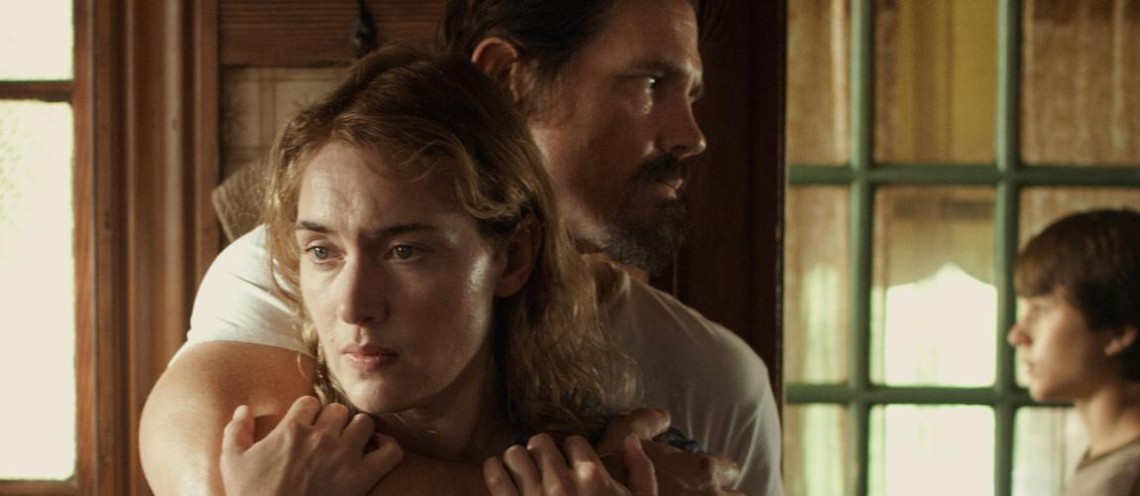Jason Reitman’s latest film is surprising. It manages to preserve only scarce traces of what defined its predecessors, Juno, Up in the Air and Young Adult – a particular sense of humour that infused the overall tone and shaped the films’ attitude. Labor Day, on the other hand, clearly derives from the poetics of a classical melodrama. By changing his authorial strategy, Reitman took a risky step.
The director based his screenplay on a same-titled novel by well-known American author Joyce Maynard, a specialist in classical and para-biographical books. Adele (Kate Winslet) is a deeply depressed single mother who also seems to suffer from agoraphobia. Her husband left some time ago and started a new life. It is her teenage son Henry, who is the head of the family now, supporting his mom the best he can. When, on the eve of Labor Day, they go the supermarket for their once-a-month-bulk-shopping, they stumble upon Frank – a strapping, darkly attractive man with a mysterious blood stain on a shirt. It soon turns out he is fugitive, convicted for first-degree murder. Yet somehow Frank manages to convince Adele to grant him a few hours of her hospitality: a temporary shelter and help with the wound. Unexpectedly, the brief emergency visit turns into a longer stay.
Soon, runaway Frank proves to be a perfect master of the house, superb in various repairs: fixing, patching, oiling, polishing. Moreover, his gift of instinctively targeting objects in need of his helping hand is striking. He’s also always there to serve Henry with an advice about women or baseball. It goes without mention that Adele receives all sorts of support from him, and their in-depth conversations are endless. On top of everything, sensual and compassionate, Frank is also a great cook! The scene in which the protagonists are preparing a peach cobbler together can easily compete with the legendary sculpting-in-clay episode from Ghost – although here eroticism and lyricism mix in with the grotesque in quite confounding and startling way. Over the course of just a few days the intruder smoothly becomes head of the family, the miraculously retrieved missing piece in the puzzle. The stigma of the murderer becomes less and less visible, wearing away with further situations, conversations and glances.
But also – if you believe him – Frank’s story is indeed all but typical. Him and Adele are as two crooked mirror images of the same figure, both carrying the secrets of their destructive past. Frank is a prisoner in prison, Adele a prisoner in her own home. They both long for freedom but cannot win it alone, only together. Frank’s arrival has almost allegorical weight in the narrative. When, at one point, Adele tell him “he came to save her”, his protagonist is portrayed almost as The Lord and Saviour. Just that this godly figure wears no white garment, uncovering a muscular torso and strong, masculine arms. His weapon of choice is iron.
Young Adult, Reitman’s previous film starring the brilliant Charlize Theron, is perhaps the best he has ever made: (pop)culturally conscious, ironic, sharply intelligent and original. Unfortunately the picture did not reach ever near the success of his previous productions. It might be the reason why, in the very professionally executed Labor Day, Reitman changes the melody. This is where the game he plays with the viewer, accustomed to his usual tone, becomes confusing to the audience. Instead of the trademark humorous irony the viewer gets a classic tearjerker, randomly seasoned with witty moments. The protagonist are one-dimensional as cardboard cutouts. Winslet, as depressed single mother, is even more unkempt, makeup-less and trembling than in Mildred Pierce; Josh Brolin’s Franks a model husband and father figure imported from a prison cell (a tiny nuance). Surprisingly, Reitman looks at the development of their relationship with admiration, not questioning its unbelievable, uber-romantic trajectory, way too idyllic to be unconditionally swallowed by the viewer without choking on chunks of heavy cliches and grains of kitsch.
The only structural gate for irony in Labor Day‘s is Henry’s friend, a rebellious daughter of divorced parents, ranting and raving nihilistic, cynical comments. Usually in Reiman’s strategy they would be prophetic, but this time her cynicism does not find confirmation in the surrounding reality. Reitman blatantly serves us the story, where “there is a lot of suffering, but after all they live happily ever after”.
Upon leaving the theater we are confused: has the author simply decided to reveal his sensitive side, or if he’s just puling our leg? No matter what the truth is, Reitman’s previous incarnation was much closer to my taste and, judging by the reaction of the room, I’m not alone on this one. Mavis Gary, I miss you. Who would have thought?




















